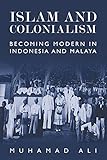Islam and Colonialism : Becoming Modern in Indonesia and Malaya / Muhamad Ali.
Material type: TextPublisher: Edinburgh : Edinburgh University Press, [2022]Copyright date: ©2015Description: 1 online resource (360 p.) : 2 B/W line art (2 maps)Content type:
TextPublisher: Edinburgh : Edinburgh University Press, [2022]Copyright date: ©2015Description: 1 online resource (360 p.) : 2 B/W line art (2 maps)Content type: - 9781474409209
- 9781474409216
- 297.095909/04 23
- BP63.I5 A437 2016
- online - DeGruyter
- Issued also in print.
| Item type | Current library | Call number | URL | Status | Notes | Barcode | |
|---|---|---|---|---|---|---|---|
 eBook
eBook
|
Biblioteca "Angelicum" Pont. Univ. S.Tommaso d'Aquino Nuvola online | online - DeGruyter (Browse shelf(Opens below)) | Online access | Not for loan (Accesso limitato) | Accesso per gli utenti autorizzati / Access for authorized users | (dgr)9781474409216 |
Browsing Biblioteca "Angelicum" Pont. Univ. S.Tommaso d'Aquino shelves, Shelving location: Nuvola online Close shelf browser (Hides shelf browser)

|

|

|

|

|

|

|
||
| online - DeGruyter The Psychoanalysis of Sense : Deleuze and the Lacanian School / | online - DeGruyter Contact : The Interaction of Closely Related Linguistic Varieties and the History of English / | online - DeGruyter Islamic Arts and Crafts : An Anthology / | online - DeGruyter Islam and Colonialism : Becoming Modern in Indonesia and Malaya / | online - DeGruyter The Style of Sleaze : The American Exploitation Film, 1959-1977 / | online - DeGruyter The Peripatetic Frame : Images of Walking in Film / | online - DeGruyter Muslims in Western Europe / |
Frontmatter -- Contents -- Glossary -- Acknowledgements -- Abbreviations -- Transcriptions and Orthography -- Map -- Introduction -- PART I MAKING ISLAM MODERN -- I Organising Da'wah and Spreading Reform -- II Colonising the Muslim East and Reinforcing Culture -- PART II MODERNISING POLITICS AND GOVERNMENT -- III Building Siyasah and Reforming Sultanate IV Controlling Politics and Bureaucratising Religion -- IV Controlling Politics and Bureaucratising Religion -- PART III MODERNISING LAW -- V Integrating Shari'ah, Adat and European Laws -- VI Formalising Legal Plurality -- PART IV MODERNISING EDUCATION -- VII Teaching Agama and the Secular -- VIII Secularising Education -- Conclusion -- Bibliography -- Index
restricted access online access with authorization star
http://purl.org/coar/access_right/c_16ec
Explores the ways in which Islam and European colonialism shaped modernity in the Indo-Malay worldFocusing on Indonesia and Malaysia, this book looks at how European colonial and Islamic modernising powers operated in the common and parallel domains of government and politics, law and education in the first half of the twentieth century. It shows that colonialisation was able to co-exist with Islamisation, arguing that Islamic movements were not necessarily antithetical to modernisation, nor that Western modernity was always anathema to Islamic and local custom. Rather, in distinguishing religious from worldly affairs, they were able to adopt and adapt modern ideas and practices that were useful or relevant while maintaining the Islamic faith and ritual that they believed to be essential.In developing an understanding of the common ways in which Islam was defined and treated in Indonesia and Malaysia, we can gain a new insight to Muslim politics and culture in Southeast Asia.Key FeaturesShows how Asian Muslims and European Christians developed modern approaches to politics, law and education which formed the basis for governance and civil society in the independent nations of Indonesia and MalaysiaAdds to a more nuanced understanding of the relationship between Islam and the WestDemonstrates that colonial-Islamic relations were less confrontational, both conceptually and institutionally, than has been previously believedUses comparative history to emphasise common and parallel features between diverse forces for change
Issued also in print.
Mode of access: Internet via World Wide Web.
In English.
Description based on online resource; title from PDF title page (publisher's Web site, viewed 02. Mrz 2022)


